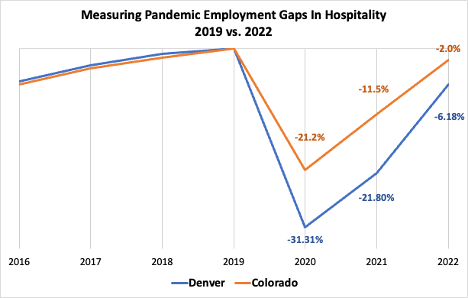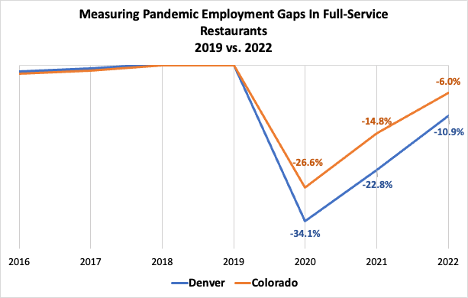Denver’s recently-announced hike will put its minimum wage among some of the highest in the nation: the standard rate will reach $18.29 per hour in January, and the tipped minimum wage will be $15.27 per hour.
As a result of recent historic inflation, Denver has departed from the state’s more modest wage laws and seen its minimum wage skyrocket to rival the hourly rates of San Francisco and Seattle. As a result, Denver’s drastic departure from the more moderate state increases have cost the city in terms of affected industries’ recovery from the pandemic.
Until 2020, Denver followed Colorado’s state minimum wage laws, which raised the required hourly rate by $0.90 every year beginning in 2007, currently totalling $13.65 per hour. Beginning in 2020, the City and County of Denver passed its own minimum wage law to hurtle beyond the state requirements, reaching $17.29 per hour this year.
The leisure and hospitality industry, which employs the majority of minimum wage earners, has taken a serious hit in the capital compared to the rest of the state in the years following the new ordinance. Despite outperforming the state in terms of leisure and hospitality employment growth prior to the higher wage mandate going into effect in 2020, the city saw staggeringly larger employment losses (31% of industry jobs lost) due to the pandemic compared to the rest of the state (21% of industry jobs lost).
Recovery in high-wage Denver has been slower too: while statewide leisure and hospitality employment have recovered nearly completely, Denver’s hospitality employment deficit in 2022 compared to 2019 is nearly three times (6.2% of 2019 hospitality employment) the size of the state’s (2.0% of 2019 hospitality employment).

This has also been the case for full-service restaurants, which are also affected by Denver’s rapidly rising tipped minimum wage. Denver’s full-service restaurant employment has suffered significantly more than the industry statewide, experiencing a sharper decline in jobs due to the onset of the pandemic and slower recovery.

This finding falls in line with Metropolitan State University of Denver economist Kishore Kulkarni, who warned Denver’s newest increase could trigger additional unemployment and price inflation. Overwhelmingly, the majority of economic studies find that minimum wage increases cause job losses.
There are various factors affecting hospitality and restaurant employment, particularly surrounding the last several years and COVID-related lockdowns. Yet comparing Denver’s runaway minimum wage increases and their effects on the city’s economic recovery compared to the rest of the state suggest unbridled wage hikes could be stunting businesses’ ability to fully recover from the pandemic.
